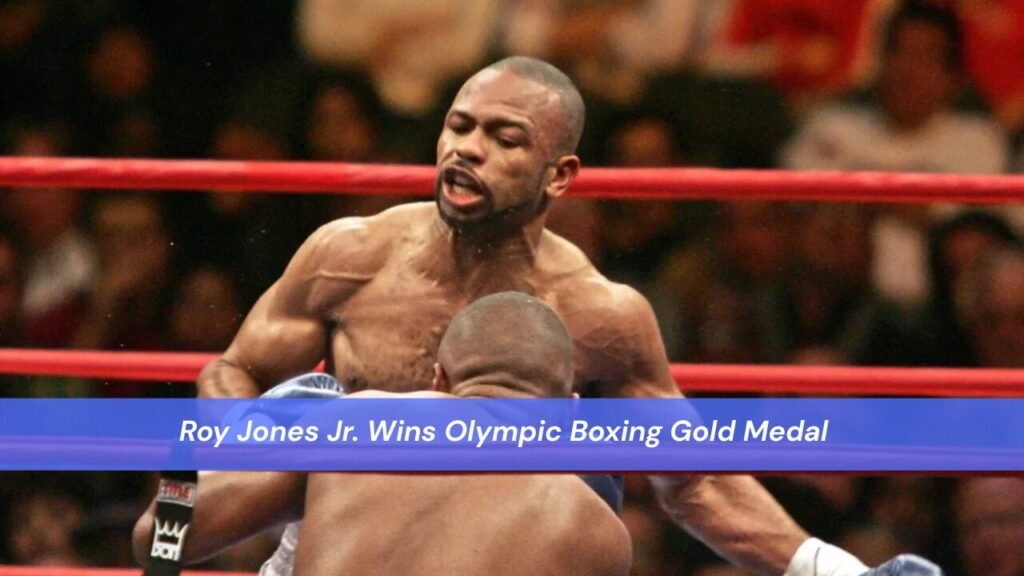From the moment the 1988 Olympic final ended, many in the boxing world believed the phrase Roy Jones Jr. boxing gold medal should rightfully refer to him not his opponent. Jones dominated that fight, yet the judges awarded gold to Park Si-hun. It was a decision that would reverberate through Olympic boxing for decades. In 2025, a dramatic twist occurred: Park voluntarily handed over his gold medal to Jones in what many viewed as symbolic justice. This article dives deep into that journey: how the decision happened, its aftermath, the emotional return of the medal, and what it all means for legacy, sportsmanship, and reform.
Key Takeaways
Before we get into the full breakdown, here are a few snapshots to guide you. These takeaways will give you a sense of where each option shines and what kind of projects they fit:
- Dominance didn’t guarantee gold in 1988, Roy Jones Jr. clearly outperformed his opponent but lost on points.
- Judging is vulnerable to the controversy exposed how subjective scoring can be swayed by external forces.
- Symbolic justice matters Park’s handing over of the 1988 medal to Jones in 2025 delivered a powerful emotional correction, even if not an official one.
- Legacy is more than records public memory, fairness narratives, and moral gestures often shape how history judges champions.
- Ongoing reform is essential symbolic acts don’t replace structural changes to ensure transparency, accountability, and fairness in sport.
Background & Build-Up
1. Roy Jones Jr.’s Amateur Rise
At 19 years old, Roy Jones Jr. was among the youngest U.S. boxers at the 1988 Seoul Olympics. Yet he had already shown exceptional speed, technique, and confidence. His path to the final was emphatic; he didn’t lose a single round en route.
His performances generated buzz: he was widely seen as a rising star, primed to carry U.S. boxing forward.
2. Olympic Boxing in 1988: Context & Stakes
Boxing at Seoul spanned from 17 September to 2 October 1988, featuring 432 athletes from 106 nations.In the light middleweight (≤71 kg) bracket, 36 boxers competed.
Expectations were high, and the home crowd in Korea would naturally rally behind their athletes. Under those pressures, judging in subjective sports like boxing was already vulnerable to controversy.
The 1988 Olympic Final & Controversial Decision
The Fight Jones vs. Park Si-hun
Jones faced Park Si-hun, a 23-year-old South Korean boxer, in what would become a defining moment. Analytical stats from the bout show:
- Jones landed 86 punches, while Park landed 32.
- Park received two standing eight-counts and two referee warnings.
- Many observers judged that Jones dominated all three rounds clearly.
Despite all that, the final decision went to Park by a 3–2 split.
2. The Judging Decision & Immediate Reaction
The verdict stunned many:
- The announcer Marv Albert, broadcasting for NBC in the U.S., famously said on air: “Park Si-hun has stolen the bout.”
- One of the judges later reportedly admitted error.
- Three of the judges who voted for Park were suspended for six months pending investigation.
- Investigations later raised allegations that some judges may have been influenced or pressured by national interests.
Jones refused to wear the silver medal, making visible his protest and sense of injustice.
3. Official Responses & Investigations
The backlash was swift:
- The U.S. The Olympic Committee pushed for further inquiry.
- In 1996, documents from the East German Stasi (secret police) surfaced, suggesting judge bribery in favor of South Korean boxers though nothing was conclusively proven.
- In 1997, the IOC’s final review concluded no definitive evidence existed to overturn the result.
Yet Jones was awarded the Val Barker Trophy (for the most outstanding boxer of the Games) a recognition that, in effect, tacitly acknowledged his dominance.
Aftermath & Legacy
1. Jones’s Professional Ascendance
Despite the Olympic setback, Roy Jones Jr. turned pro and became one of boxing’s all-time greats:
- He held world titles across four weight classes: middleweight, super middleweight, light heavyweight, and heavyweight.
- He became the first former middleweight champion in over a century to capture a heavyweight title (in 2003).
- Over his career, he recorded 66 wins (including 47 KOs) and 9 losses.
His speed, reflexes, and ring IQ cemented his status among boxing royalty.
Reforms & Lessons in Olympic Boxing
The 1988 fiasco catalyzed meaningful changes:
- The controversy prompted amateur boxing authorities to revise scoring systems, emphasize transparency, and reduce judges’ subjectivity.
- It became a cautionary tale of how bias, national interests, or politics can overshadow athletic merit.
- Jones’s case has since been repeatedly cited in debates on judging reform across subjective sports.
3. Psychological & Moral Impacts
For Jones:
- The sense of being robbed left a long emotional imprint, even though he refocused on his pro career.
- It gave him a moral narrative that accompanied his boxing legend.
For Park:
- Park reportedly carried deep guilt and psychological burden. He later acknowledged he felt he didn’t deserve the win.
- After retiring as an amateur, Park became a teacher and later a boxing coach.
The Medal Return in 2025
1. How It Happened
In 2025, the story took an emotional, redemptive turn:
- Park Si-hun traveled from South Korea to Pensacola, Florida, where Jones lives. He visited Jones’s ranch under the pretense of an interview but instead brought with him the gold medal from 1988.
- In a private ceremony, Park told Jones (through his son translating): “I had the gold medal, but I wanted to give it back to you; it belongs to you.”
- Jones, overwhelmed, reacted with emotion placing his hand on his face, exclaiming, “Wow, that is crazy.”
- The video of their meeting, filmed by Emmy-winning director Johnny Sweet, was released publicly in September 2025.
2. Symbolic vs. Official Meaning
- Importantly: the IOC record was not changed. Park remains the official 1988 Olympic gold medalist in the record books.
- Nevertheless, for many fans, historians, and Jones himself, the handover served as symbolic justice and a narrative correction decades too late.
5. Impact & Meaning
1. A Powerful Symbol of Sportsmanship
The act of returning the medal transcended boxing:
- It showed humility, admission of past error, and acknowledgment of athletic merit.
- It resonates beyond sport as an example of reconciliation, respect, and integrity.
2. Legacy Reframed
Because of that handover:
- The phrase Roy Jones Jr. boxing gold medal now has both official and emotional weight; the medal may not be recorded as his, but many see it as rightfully so.
- Jones’s legacy is further strengthened, not only as a fighter but as a figure of principle.
3. Implications for Sport Governance
The story underscores ongoing challenges:
- How do sporting bodies ensure fairness, impartiality, and transparency in subjective judging?
- Symbolic gestures may heal wounds, but structural reform remains essential.
- Future athletes may feel more empowered to demand accountability when they perceive injustice.
FAQs
Did Roy Jones Jr. ever officially become the 1988 Olympic gold medalist?
No. The official records still list Park Si-hun as the 1988 Olympic gold medalist. The 2025 medal handover does not change the IOC’s record.
Why did the IOC refuse to reverse the decision earlier?
Despite investigations and suspicion, the IOC’s 1997 review stated there was no conclusive evidence to prove judge bribery or corrupt influence strong enough to overturn the verdict.
Was anyone punished for that judging decision?
Three judges were suspended temporarily. Some judges in related controversies were later banned, but no major reversal or long-term record changes occurred.
How do boxing fans view that fight today?
Many regard the 1988 final as among the greatest judging injustices in Olympic history. Jones is often seen as the moral and technical winner, and the fight is cited in discussions on judging reform.
Does the medal return affect Jones’s pro record or accolades?
No professional boxing and Olympic achievements are separate. However, the medal return enhances the narrative arc of his legacy.
Conclusion
The story behind Roy Jones Jr. boxing gold medal is not just about who holds what medal, it’s a saga of competition, controversy, endurance, and reconciliation. Jones’s dominance in that fight, the unfair decision, and his legendary professional career all built his case beyond mere statistics. Then, over three decades later, Park’s act of returning the medal added a human and redemptive chapter to the narrative.
While the record books may never officially change, the medal now physically lies in the hands of the fighter many believe deserved it all along. That gesture doesn’t erase the past, but it reshapes how we remember it. In sport as in life sometimes the harshest lessons, the deepest wounds, and the humblest corrections define more than titles ever can.




